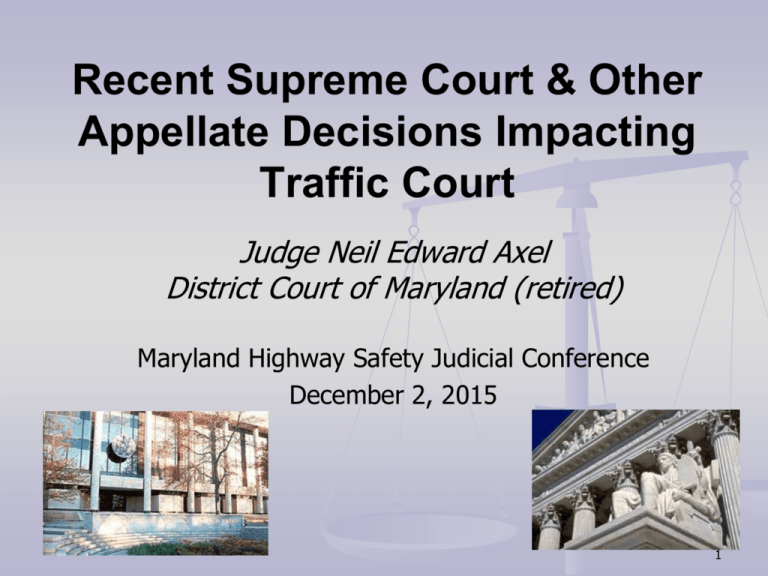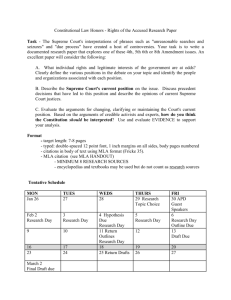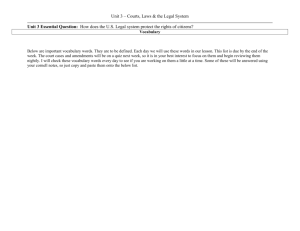File - Maryland Highway Safety Judicial Conference
advertisement

Recent Supreme Court & Other Appellate Decisions Impacting Traffic Court Judge Neil Edward Axel District Court of Maryland (retired) Maryland Highway Safety Judicial Conference December 2, 2015 1 Hypothetical: Is there RAS to effect traffic stop? 911 call from named caller that car “ran me off the road 5 minutes ago” (3:45 p.m.) Caller described vehicle, tag #, location and route of travel 13 minutes after dispatch call, vehicle matching description is located police follow vehicle for 5 minutes, observing no erratic driving/infractions Traffic stop made 18 minutes/19 miles after 911 call 2 Navarette v. California 134 S.Ct. 1683 (2014) HELD: Tip was reliable Eyewitness knowledge Contemporaneous report Caller used the 911 system Call created reasonable suspicion of drunk driving Once officer had RAS, there was no need to personally observe/verify suspicious driving 3 Rodriguez v. United States 135 S.Ct. 1609 (2015) Issue: reasonable duration of a traffic stop Officer’s legitimate mission before issuing citation: check license, registration & insurance check for outstanding warrants Once purpose of traffic stop has been addressed – or reasonably should have been addressed – officer cannot extend the stop even briefly for unrelated investigative activities The critical question is not whether dog sniff occurs before/after issuance of ticket, but whether it prolongs the stop 4 Searches Incident to Arrest A Brief Chronology Chimel v. California, 395 U.S. 752 (1969) warrantless search of entire house incident to arrest was unreasonable in scope reach, lunge or grasp for evidence or protection of officer Belton v. New York, 453 U.S. 454 (1981) Arizona v. Gant, 556 U.S. 332 (2009) Return to “reach, lunge or grasp” except where: there are reasonable grounds to believe evidence relevant to the crime of arrest might be found 5 Taylor v. State __ Md. App. __ (8/27/15) Traffic stop based on: After stop “estimated” speed of 45 in a 25 mph zone failure to stop at stop sign on left turn Minor odor of alcohol Slurred speech; bloodshot & glassy eyes Coming from “Point Break Beach Bar” Failed SFSTs Arrested for suspicion of DUI 6 Taylor v. State (continued) __ Md. App. __ (8/27/15) Search of vehicle: 2nd officer searches vehicle while Taylor is advised per DR-15 CDS found inside closed center console 1st officer then returns to car and seizes CDS Search was to “locate any other alcohol, open containers, anything pertaining to the DUI arrest” HELD: Search of vehicle did not violate 4th amendment rights. Valid search incident to DUI arrest Standard: “reasonable suspicion” or “reason to believe” under Terry v. Ohio DUI arrest provides reason to believe there will be containers of alcohol in the vehicle 7 Riley v. California 134 S.Ct. 2473 (2014) Following traffic stop & arrest on a weapons charge, police seize Riley’s cellphone from his pants pocket Held: Warrantless search of cell phone’s digital information incident to arrest violates 4th amendment Examination of phone’s physical aspects to ensure that it will not be used as a weapon is permissible “cell phones differ in both a quantitative and a qualitative sense from other object that might be kept on an arrestee’s person.” 8 Post-Riley Maryland Cases Spence v. State, 444 Md. 1 (2015); Demby v. State, 444 Md. 45 (2015) Search of digital information on arrestee’s cell phone incident to arrest violates 4th Amendment Other 4th Amendment exceptions may apply Police, however, reasonably relied upon then-binding precedent → exclusionary rule inapplicable Sinclair v. State, 444 Md. 16 (2015) Officers should have obtained a warrant to retrieve photos from phone objection, however, waived since not raised pretrial 9 Pyon v. State 222 Md.App. 412 (2015) FACTS: Officer dispatched to residential area following anonymous tip of possible drug activity; partially blocked front of parked vehicle and immediately asked for license ISSUE: Is this a lawful Terry-stop, a Ferris-accosting, or 4th amendment violation? Three tiers of interaction between a citizen and police Arrest – 4th amendment implicated Investigatory stop – 4th amendment implicated Consensual encounter – 4th amendment not implicated 10 Pyon v. State 222 Md.App. 412 (2015) HELD: actions subjected Pyon to a 4th amendment seizure without 4th amendment justification “every action taken . . . indicated that [officer] was following routine police procedures for . . . a traffic stop.” Litmus test = whether reasonable person would have felt free to leave 11 Missouri v. McNeely, 133 S.Ct. 1552 (2013) Issue presented: “whether the natural dissipation of alcohol in the bloodstream establishes a per se exigency that suffices on its own to justify an exception to the warrant requirement for nonconsensual blood testing in drunk-driving investigations” 12 McNeely’s Arrest At 2:08 a.m. McNeely is stopped for speeding and repeatedly crossing the centerline odor of alcohol on his breath bloodshot eyes, slurred speech, unsteady on feet when exiting car admits to a “couple of beers” failed SFSTs. Refused PBT, breath test & blood test Blood drawn at hospital at 2:35 a.m. over objection BAC = 0.154 13 Missouri v. McNeely: The Holding Non-consensual blood draw constitutes a search subject to 4th Amendment scrutiny Metabolization of alcohol is not per se exigency Question of exigency to be decided caseby-case 14 Missouri v. McNeely: The Holding “The natural dissipation of alcohol in the blood may support an exigency finding in a specific case, as it did in Schmerber, but it does not do so categorically.” “When officers in drunk-driving investigations can reasonably obtain a warrant before having a blood sample drawn without significantly undermining the efficacy of the search, the Fourth Amendment mandates that they do so.” 15 Exigent Circumstances As Exception to Warrant Requirement When ‘ “the exigencies of the situation” make the needs of law enforcement so compelling that [a] warrantless search is objectively reasonable.’ ” Kentucky v. King, 563 U.S. 452, 131 S.Ct. 1849 (2011); Mincey v. Arizona, 437 U.S. 385 (1978) Ethanol & THC Dissipation in the Body Metabolism/Elimination rates: relatively constant (0.015%/hr.) Faster for experienced drinkers (0.020%/hour) Comparison of Cannabinoid Pharmacokinetic Properties in Occasional and Heavy Users Smoking a Marijuana or Placebo JointStefan W. Toennes1,*, Johannes G. Ramaekers2, Eef L. Theunissen2, Manfred R. Moeller3, and Gerold F. Kauert1 17 Exigent Circumstances Possible Examples Officer delayed by need to investigate crash Officer had to go to hospital to begin DWI investigation Suspect was being treated for injuries Alcohol/drug dissipation Time necessary to obtain warrant Unavailability of magistrate/judge 18 Exigent Circumstances: Developing Caselaw State v. Dahlquist, 752 S.E.2d 665 (NC 2013) 4-5 hours necessary to obtain search warrant constituted exigent circumstances to excuse warrant requirement Police, however, should consider amending procedures to use technology and best practices to minimize delays in obtaining warrants State v. Brennick, 753 S.E.2d 740, (No. CO13-627, NC 2013)(unpublished disposition) Exigency existed where closest magistrate was 21 miles away and officer was concerned about losing access to the defendant at hospital due to impending surgery for injuries suffered in accident. Again, court suggested use of video conferencing to obtain warrant in the future 19 Exigent Circumstances: Developing Caselaw Sutherland v. State, 436 S.W. 3d 28, 2014 WL 1370118 (Tx.App.2014) would take 5-7 minutes for magistrate to review search warrant affidavit; magistrate was 2.5 miles from arrest site; phlebotomist was located 100 feet from magistrate; no collision, no medical emergency, & no need to take driver to the hospital; officer had software to facilitate warrant application HELD: no exigency 20 Consent Searches As Exceptions to the 4th Amendment Consent to search, freely given, is an exception to the warrant requirement of the 4th amendment. Schneckloth v. Bustamonte, 412 U.S. 218, 229 (1973) When basis for warrantless search is consent, consent may be withdrawn any time prior to completion of search. Burton v. U.S., 657 A.2d 741 (D.C.Ct.App. 1994); U.S. v. Sanders, 424 F.3d 768 (8th Cir. 2005) 21 United States v. Slagle 2015 WL 5897740 (D.Md, 10/6/15) Issue: whether McNeely applies to breath tests Argument: Constitutional right not to surrender to the demand for a breath test Implied consent law unconstitutionally coercive Breath test cannot be compelled without a warrant Held: McNeely does not hold one has a constitutional right to refuse a breath test Sanctions for breath test refusal are not unconstitutionally coercive 22 Related McNeely Issues & Unanswered Questions Are blood test results obtained via search warrant entitled to statutory presumptions? Is implied consent sufficient consent to drawing of blood? Impact on Maryland’s blood draw in case of fatality or life threatening injury? THC dissipation = exigency? Can implied consent be withdrawn? 23 MVA v. Deering 438 Md. 611 (2014) Administrative proceeding to suspend license based on BAC ≥ 0.08 Denied pre-test right to consult counsel Sites right to counsel pre-test based on due process, not 6th amendment right to counsel Driver may withdraw one’s implied consent – albeit for a price 24 When A Non-consensual Blood Draw Is Lawful: A Review With a search warrant Without a search warrant Consent not required Exigencies not required under exigent circumstances; or by consent Incident to medical treatment (no 4th amendment issue) 25 Harding v. State 223 Md.App. 289 (2015) Trier of fact may infer guilt from refusal to submit to chemical test Not violative of 5th amendment “Awareness that one was both drunk and driving could well provoke consciousness of guilt.” 26 Driving While Suspended Mens Rea/Knowledge Steward v. State, 218 Md.App. 550 (2014) Evidence was sufficient without evidence of actual knowledge Previous suspensions & a failure to notify MVA of address change for over a year Held: the jury could reasonable infer defendant was deliberately avoiding contact with the MVA and was thus 'willfully ignorant' of the suspension Related cases McCallum v. State, 81 Md.App. 403 (1990), aff'd 321 Md. 451 (1991) Rice v. State, 136 Md.App. 593 (2001). Sullivan v. State, 180 Md.App. 35 (2008) aff’d 407 Md. 493, 966 A.2d 919 (2009). White v. State, 217 Md.App. 709 (2014) 27 Questions? Comments? 28






